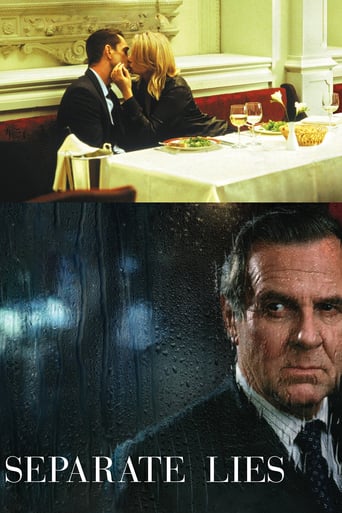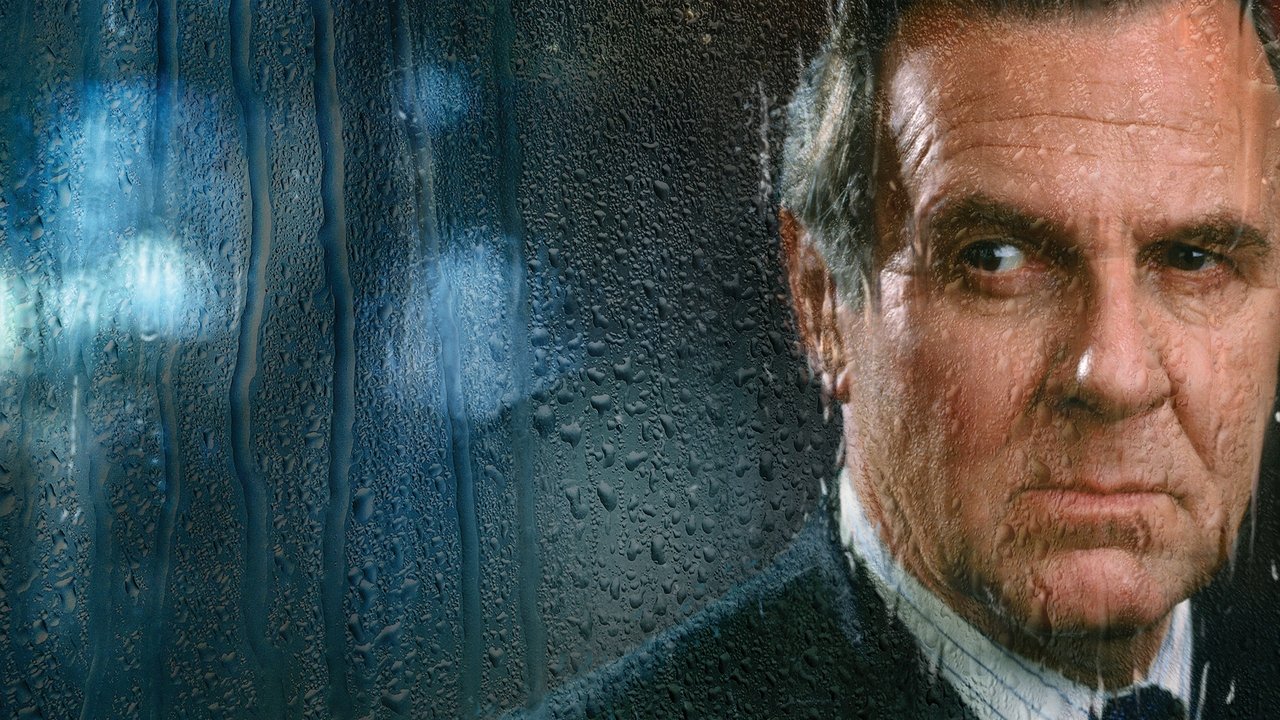Malcolm Taylor
The strength of this film is its straight talking characters who seem bored with the British tradition of keeping up appearances. They spit forth bold truths, when cornered, ripping off the veil of entrenched lies and secrecy at the drop of a hat. This British film uses this boldness in nimble ways through out, allowing it to sidestep typical American dramatic clichés.For instance, when Bill, played with delightful abandon by Rupert Everett, calls James, carved out with intense subtlety by Tom Wilkinson, in order to corroborate their story for a police investigation, the cuckolded James wants to skip to the part where he gets to beat up Bill. But Bill responds deftly with, "Oh yes, yes. We can do all that later..." James concedes for the moment. Still, he gets his revenge, minus the dramatics, knocking Bill flat with an un-telegraphed punch. Cut. No dramatics required.Likewise a "F--- Bill!" out burst from James during an exchange with his wife Anne, played with great sympathy by Emily Watson, leads her to confess that, yes, that is exactly the point, "I have been f---ing Bill. Or rather he's been f---ing me." A frank confession from a cornered character for whom denial is the more difficult choice.When push comes to shove, the potential shove is either accepted as in Bill's case above, or diffused by a confession such as Anne's. She believes the simplest way forward is to suffer justice, anything to escape the burden of lying. Meanwhile the only way forward for James is exactly the opposite: to cover up, get your story straight and barrel forward. But even he needs lessons from Bill once he's brought into the fray and forced to corroborate with his wife's seducer as the only way forward.One of the big vacancies of this film is that is doesn't give James a dirty little secret that he is hiding. His wife Anne keeps saying how he's perfect, setting the viewer up for the opposite. Only the screenplay co-written by Nigel Balchin and Julian Fellowes seems to have no qualms about him being perfect. James' only flaw is that he's a workaholic. His late nights are genuinely given over to the firm. Yes, he has a minor tryst with his secretary, but only after Anne's transgressions mount to be irreversible.The film seems to let James off the hook for the end of his marriage. It allows him to revel in victim mode, choosing bitterness as his outlet. He never examines his own behaviour and the impact it may have had on the dissolution of his marriage. His greatest fault, the product of his work-obsession: he's fathered no offspring. This, according to Anne, is because he's too concerned with order to welcome the chaos children would level on his house. That's a little nit-picky, isn't it? We usually look for something grander. If he has no dark secret, is there much point to the entire film? He doesn't even exhibit the slightest lingering stare at his secretary! Anne's suggestion that they as a couple remain friends with Bill even after she's ended her affair with him solicits the following response from James, "That's a little too Jerry Springer for me." A huge door is offered here through which likewise elements could stick themselves to James giving him a much-needed point of antithesis. Yet the script sadly leaves this door firmly shut.As a result the film is slightly anorexic in this regard. And it shows with a surprisingly slim running time of just over 80 minutes, only slightly longer than a television episode. With such a brilliant cast one could easily follow their intermingling for a few more unexpected turns, at least another 20 minutes or so. No doubt this is a credit to the exceptional cast who it seems, make this film feel slightly better than it actually is. In the process exposing it for being slightly less than stellar.
blanche-2
Another great Tom Wilkinson performance punctuates "Separate Lies," a 2005 film also starring Emily Watson, Linda Bassett and Rupert Everett. Directed by Julian Fellowes, it's the story of a married couple, James and Ann Manning where the husband (Wilkinson) believes he and his wife (Watson) are happy together. An accident near their house on the night they have a party brings the police around. It is a hit and run that killed their maid Maggie's (Bassett) husband. James becomes suspicious of a neighbor, Bill Bule (Everett) when he sees some damage on his car. He confronts Bule, who admits he did it and promises to go to the police the next day. When James arrives home, Ann is angry that he is making such a big deal out of it and states that she was driving the car. Of course, James then isn't so eager to rush to the police. She suggests that they call Bule and tell him their decision. "Oh, f___ Bule," James says. "Well, that's just it," Ann says. "I am f___ing Bule." James' devastation is just the beginning in this well-crafted drama. Without giving the plot away, this is a good example of how gender switching changes a story. Example of what I mean: Susan Smith drives her car into a lake and her children drown. She gets life in prison. What if the father had done it? The chair. You'd be surprised how often the outcome would be different. The same is true here - if it had been James having the affair and doing the subsequent activities, viewers might feel differently about the story. If Ann were in James' place, it would be shattering. As it is, it's tremendously sad.Tom Wilkinson is heartbreaking as a man blindsided by the woman he adores, and Emily Watson does a beautiful job as Ann, who, once she frees herself from her lies - her involvement in the accident and the happy marriage - knows what she has to do. Rupert Everett as Bule is very effective - indolent, uppity and ultimately in need. Everyone here is very civilized in their dealings with one another, and no one is all good or all bad.There are separate lies - James that his marriage is happy, Ann's as listed above - and there is one uniting lie - the accident, about which all parties keep quiet. It's enough for Ann that Maggie knows. In the end, all must deal with the separate lies that the single lie uncovered.Brilliant film.
ensaga
There are so many more complexities to the plot of this wonderful thought provoking movie than just infidelity and cover-up of responsibility for the accident. I was struck by the initial seeming goodness of husband Wilkinson who wanted the driver, when he thought it was Everett, disclosed to the police, and the change of heart (and morals) when he learned it was his wife. As well, was he indeed good, and/or was he attempting to redeem self by allowing her to go with Rupert. Then, things switchedand SHE decided the right ting to do was admit that she hit him. Most importantly the theme of redemption (for the accident - for the infidelity - in her own odd, flawed way)is strongest in Watson's sickbed care for Everett. I believe that is why she undertook that effort.This seems to be a common theme in modern British novels: Brideshead Revisited, The End of the Affair come to mind. Love it.
Philby-3
Although this film is set amongst the sophisticated English upper classes it is a simple story of a couple torn asunder. It has a slightly dated air, being an adaptation of "A Way Through the Wood", a 1950 novel by Nigel Balchin (once hugely popular and now forgotten). Julian Fellowes, who despite an academy award for the script of "Gosford Park", has a somewhat anachronistic persona himself, wrote the script and directed (the latter for the first time). With the DVD version I saw there is a most illuminating audio commentary by Julian. His primary focus was on getting his characters right, and by and large he has succeeded. In this he was helped by two outstanding performances from Tom Wilkinson as James, the stitched up City lawyer, and Emily Watson as his attractive wife Anne. He also kept it short; the running time is only 80 minutes.James and Anne have a town house in Chelsea and a comfortable former vicarage in Buckinghamshire. Anne is some years younger but they are childless. Outwardly they seem happy, but James, one of nature's moralists (unusual for a city lawyer), is a control freak. Just down the road is the aristocratic the Hon. William Buel, who is not one for middle-class morality, and he is more than happy to take advantage. But there's a complication, a road accident, in which an elderly cyclist is knocked over in a country lane by a ruthlessly driven Range Rover just like the Hon. Bill's. Soon James, Anne, Bill and the victim's widow (who happens to be James' and Anne's cleaner) are drawn in to a conspiracy to conceal what really happened. The primary focus is on the corrosive effect of all this on James and Anne's relationship.The third person in this ménage a trios, Bill, is played by Rupert Everett. From the point of view of casting, his languid, superior manner is right for the part, yet somehow he doesn't quite get there. Partly this is because he is supposed to be sick for some of the time and he looks well when he is supposed to be sick, and vice-versa. The part seems underdeveloped. It is interesting that John Neville as Bill's father who has only one significant scene manages to establish his character beautifully in the time he has.The world of five star hotels and superior restaurants is nicely evoked. As Julian Fellowes says in the audio commentary, these people are able to convince themselves that the Edwardian age still exists. At bottom though, the film is about what draws a couple together and what tears them apart. Nigel Balchin was going through a marriage break-up when he wrote the book, and Fellowes has made a good fist of conveying the atmosphere. As he says, his is a fairly free adaptation, but the central theme is the same.



 AD
AD


